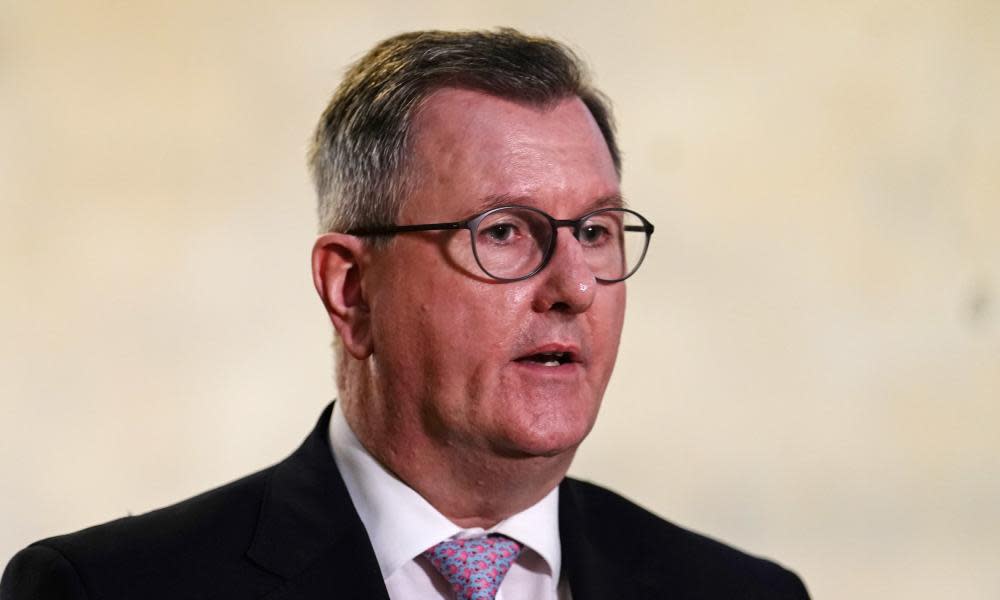DUP leader faces stark and binary choice over any NI protocol deal

The Democratic Unionist party has said any Northern Ireland protocol deal must meet its “seven tests” but they omit the one that really matters: the test of Sir Jeffrey Donaldson’s leadership.
The seven conditions concern laws and trading rules, which have room for fudge and ambiguity.
The choice facing Donaldson, in contrast, appears stark and binary: accept and sell the deal to unionism, paving the way for the restoration of power sharing. Or reject it and continue the DUP’s boycott of the Stormont assembly and executive.
The Lagan Valley MP made his name and career as a flinty hardliner by opposing the Good Friday agreement in 1998 but now has a reputation as a pragmatist who wants to revive devolved government in Northern Ireland.
A protocol deal will be the political equivalent of tying him to two horses which gallop in different directions – an ancient form of dismemberment and execution.
Factions within the DUP, including powerful figures such as Sammy Wilson and perhaps also Nigel Dodds, are expected to reject a deal that leaves Northern Ireland subject to EU law. These factions could rally the party’s grassroots, who view Brussels as a threat to their Britishness.
Jim Allister’s Traditional Unionist Voice, a rightwing rival that eats DUP votes, is poised to denounce any deal as a sellout. Working-class loyalists such as Jamie Bryson, as well as paramilitary groups, may also reject any deal as insufficient to guarantee Northern Ireland’s place in the UK.
Added to all this the looming council elections in May creates a powerful force pulling Donaldson in the direction of rejecting the deal. To do otherwise risks an internal revolt and punishment at the polls.
The countervailing force is less urgent and immediate but profound: the future of power sharing and Northern Ireland itself. If the DUP continues its boycott, Stormont, already in mothballs, may wither and die. That will further destabilise the region and force London and Dublin to step in, leaving unionists on the sidelines.
The DUP’s hard line on the protocol has been popular but previous stalemates in Northern Ireland show diminishing returns from entrenchment. Most voters rank healthcare and the economy above the protocol, and business leaders are pleading for resolution.
More profoundly, a continued boycott will raise questions about whether Northern Ireland is a failed state. For a party devoted to protecting the union that would be self-sabotage and a gift to the Sinn Féin and Irish nationalists who want a referendum on unification.
The test of Donaldson’s leadership is whether he is prepared to risk his position and electoral damage for the union’s long-term good.
In a polity built on constructive ambiguity – the Good Friday agreement let each side see what it wanted – the DUP leaders may seek refuge in a third option: defer a decision, play for time, say it needs to be studied, try to get past May’s elections. Conceivably, Donaldson could let Stormont revive while still ostensibly opposing the protocol, just as the DUP took power in Stormont while still ostensibly opposing the Good Friday agreement.

 Yahoo News
Yahoo News 
